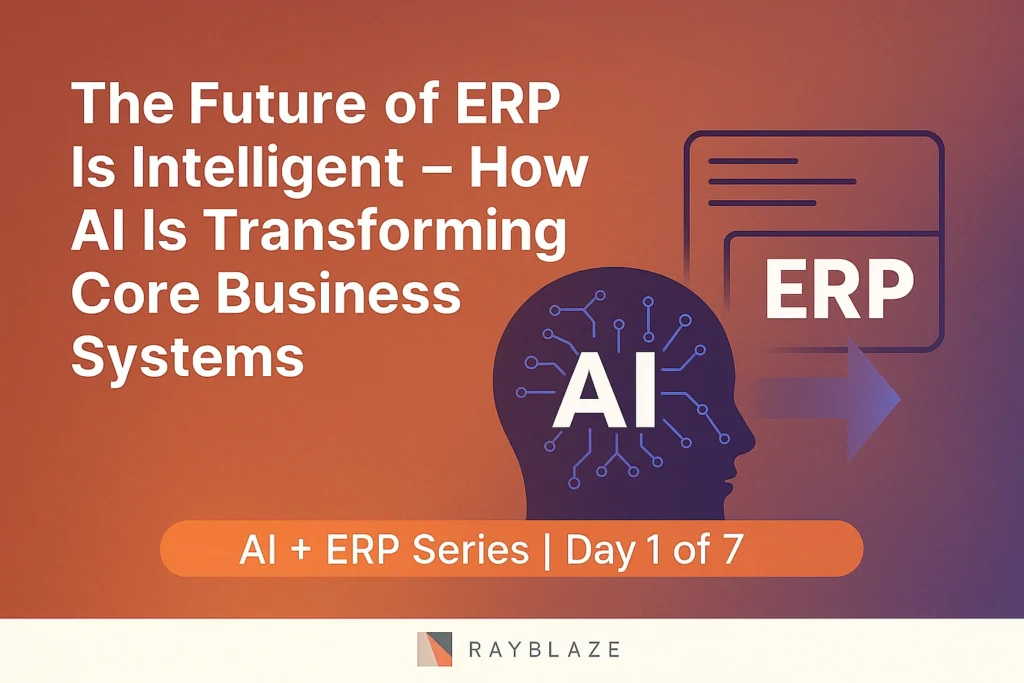The Future of ERP Is Intelligent – How AI Is Transforming Core Business Systems

By Rayblaze Global Private Limited
Introduction: Why ERP Alone Is No Longer Enough
Enterprise Resource Planning (ERP) systems have been the backbone of business operations for decades. They centralize data, automate transactions, and enforce process discipline across finance, HR, procurement, inventory, and more.
But today’s business landscape demands more than just transactional efficiency—it requires systems that learn, adapt, and predict. That is where Artificial Intelligence (AI) enters the picture. The next evolution of ERP is not just digital—it is intelligent. Let us try to understand how AI is reshaping the ERP landscape and why forward-thinking enterprises are embedding intelligence into their core business systems.
Traditional ERP: Powerful, but Static
ERP platforms have done a great job of:
- Unifying departments
- Reducing manual work
- Standardizing data and workflows
However, most ERP systems are:
- Rule-driven (hard-coded logic)
- Reactive (respond after action)
- Dependent on manual inputs
- Rigid in analytics and reporting
In a world that moves fast, this rigidity is no longer competitive.
Intelligent ERP: What It Really Means
An intelligent ERP system integrates AI and machine learning to enhance, automate, and personalize business processes.
Key capabilities include:
- Predictive forecasting (e.g., cash flow, inventory, demand)
- Anomaly detection (e.g., fraud, transaction errors)
- Natural language interfaces (chatbots, voice assistants)
- Smart workflows (e.g., AI-driven approvals, prioritizations)
- Real-time insights with minimal human intervention
It is not about replacing ERP, but more about augmenting it.
AI in Action: ERP Use Cases Across Functions
| Function | AI Enhancement |
|---|---|
| Finance | Auto-reconcile entries, detect fraud, predict cash flow |
| HR | Attrition prediction, resume matching, employee sentiment |
| Procurement | Vendor risk scoring, price forecasting |
| Inventory | Demand planning, stockout prevention |
| Customer Service | Smart ticket routing, AI-driven self-service |
These enhancements are often modular; meaning they can be added to your existing ERP without a full system replacement.
Benefits of Intelligent ERP
- Faster Decision-Making: Real-time insights and predictions accelerate leadership decisions.
- Higher Accuracy: AI reduces manual errors and bias.
- Efficiency at Scale: Automation saves hours across departments.
- Improved UX: Conversational AI improves adoption and accessibility.
- Strategic Agility: AI unlocks trends and patterns not visible in static reports.
Common Myths Debunked
- “You need to replace your ERP to use AI” – False. AI layers can be wrapped around legacy systems via APIs and microservices.
- “AI is only for large enterprises” – Not anymore. Open-source models and cloud-based AI make it accessible for mid-sized businesses too.
- “It’s too expensive and complex” – You can start small with a single use case (e.g., invoice automation) and expand over time.
Getting Started with AI in ERP
You don’t need to “AI-ify” everything at once. A smart strategy is to:
- Identify high-impact, repetitive workflows
- Define measurable goals (e.g., reduce invoice processing time by 40%)
- Use off-the-shelf AI models or services (OpenAI, Hugging Face, AWS AI)
- Integrate via your ERP’s API layer or middleware
- Measure, refine, and expand gradually
If this is the kind of modular AI enhancement you are looking for, start from what you have and turn it into something smarter.
ERP is evolving—from a static system of record to an adaptive system of intelligence.
By infusing AI into ERP, enterprises are no longer just tracking what’s happening—they’re anticipating what’s next.
Stay tuned for tomorrow’s post, where we deep-dive into how AI is revolutionizing finance automation and ERP accounting.


